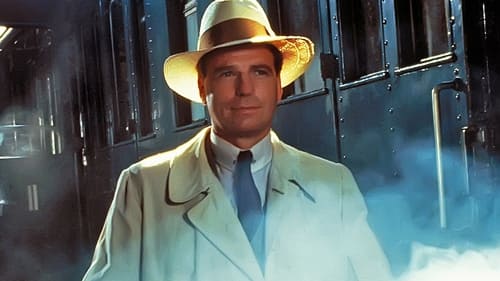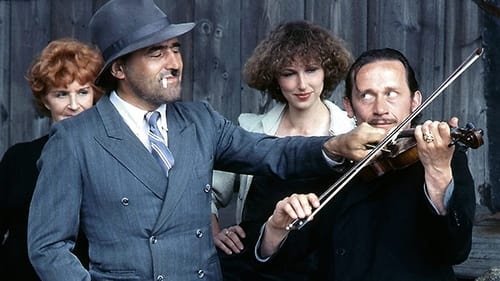Kurt Sowinetz
Nacimiento : 1928-02-26, Wien, Austria
Muerte : 1991-01-28

Egon Brecher

Stodola
In the conclusion of Axel Corti's trilogy (following God Does Not Believe In Us Anymore and Santa Fe) Freddy, a Viennese Jew who emigrated to New York after Hitler's invasion, and Adler, a left-wing intellectual originally from Berlin, return to Austria in 1944 as soldiers in the U.S. Army. Freddy falls in love with the daughter of a Nazi, and Adler attempts to go over to the Communist Zone. But with the advent of the Cold War and continuing anti-semitism, the idealism of both characters is shattered as they find themselves surrounded by cynicism, opportunism, and universal self-deception. This acclaimed, brilliant work is one of the great films of all time.

Kabinettchef Skutecky
In October 1936, a high official in the Austrian government receives a letter from a German Jewish woman with whom he had an affair in 1925 asking him to help place an 11-year-old, half Jewish boy in a good Austrian school. Is the child his? Should he help? And above all should he help now, at a time when Nazis are becoming powerful in Austria?

Lebowitz

Dr. Ebenwald

Peter Altenberg

An adaptation of a novel by Joseph Roth.

This two-part drama examines the fate of Haneke’s own generation which came of age after World War II. The first part depicts the generational gap between 1950s teenagers and their parents while the second shows this same group of characters twenty years later as they have grown up to be dysfunctional and suicidal adults. Regarded as the most significant of Haneke’s early works, Lemmings contains incipient treatments of many of the themes he would later elaborate on in his theatrical features.

Gast

Fjodor Iljitsch Kulygin

En el año 1918, un cadete de la armada llega a Belgrado para formar parte del escuadrón que protege a la princesa de Hannover en su viaje de vuelta a Viena. Poco a poco, el cadete consigue conocer a la princesa, y esos encuentros resultarán en un romance que tendrá que sobrevivir a una gran batalla.
El cadete sabe que, muy a su pesar, las tropas eslavas no lucharán todo lo necesario junto a ellos, ya que desean ver cómo el imperio se desintegra. Sin embargo, los superiores son ajenos a este hecho y ello afectará a su campaña de guerra en la que sufrirán ataques que resultarán fatídicos para ellos. Debido al código militar, los soldados deberán luchar y morir por preservar la bandera de los reyes, la cual acabará en manos del protagonista. Ahora su objetivo es el de transportar la bandera hasta la Casa Real de Habsburgo, lugar al que pertenece. (FILMAFFINITY)

Polizist

Onkel Gustav

Reichel

Otto

Issakowitsch

Testaccio
Eine Nacht in Venedig (A Night in Venice) is an operetta in three acts by Johann Strauss II. Its libretto was by F. Zell and Richard Genée based on Le Château Trompette by Eugène Cormon and Richard Genée. The farcical, romantic story involves several cases of mistaken identity. The piece premiered in 1883 in Berlin and then Vienna. It became one of Strauss's three most famous stage works and has been seen in New York, London and elsewhere, and has been adapted for film.

Fabian Strick

Kriz

Philosoph
Vienna, a few days before the shots in Sarajevo which would trigger what was first called the Great, later simply the First World War: Job seekers from the crown lands flock to the capital of the empire in search of a better life, even if it's the factory hell . A new social class is growing faster and faster, the city overflows with the poor, lower-class workers and the unemployed. Labor fighters can be heard louder, better, clearer, every day. The nobility strongly suspects its end.

Drosselmeier

Jean

Kompnist

Der Mitgefangene

Verwalter

Tells of the tribulations of a middle-aged official of the Austro-Hungarian Bureau of Weights and Measures in fighting the local shopkeepers and traders whose weights are frequently light.

Bertl Jezinka

Smelte

Rapp
Arthur Schnitzler's key piece describes the liaisons of his artist colleagues from the Cafe Central, Vienna. Behind the character "Treuenhof" is Peter Alterberg recognized, "Winkler" = Arthur Schnitzler, "Flatterer" = Frida Uhl, "Rapp" = Stefan Großmann, "Willi" = Hans Lang, "Van Zack" = Adolf Loos, and "Lisa" = Lina Loos.

Vondrak

Diener Scharf

Alfred Breitner

Mascarille

Nachtigall
After a frank confession by his wife, a doctor is called to see a dying patient. The cause of the night brings him to meet an old friend, a pianist, who tells him of a mysterious ball where he is due to perform. Based on the book "Traumnovelle" ("Rhapsody: A Dream Novel") by Arthur Schnitzler.

Josef

Johann Dunkler

Kaspar

Theodor

Sam Hersh

Asfanasij Iwanowitsch Bolschintzow

Poslanetz

August Stingl

Herr Reindl

Feldwebel Zauner

Zwirn, ein Schneidergeselle

Pjotr Kaciuk - Maschinenmaat

Zagl

Schagerl

Billing

Artur

Eisenring - ein Kellner

Estragon

Escambarlat

Amtsdiener Blimm

Einjähriger Ehrenfeld

Der Neid

Sydney Hanley

Dünner Vetter

Der Bessere








